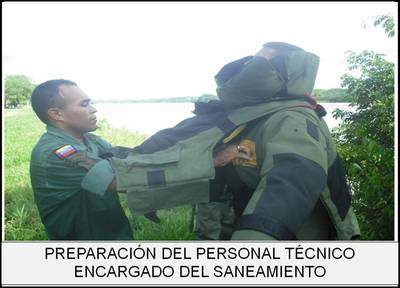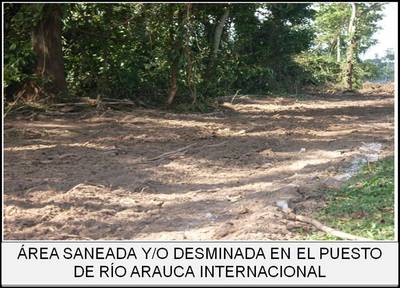27.05.2013
Former mine field in Venezuela - A formal declaration of mine clearance completion is expected in Geneva in December 2013
Geneva – Venezuela has become the latest country in the Americas to fulfil its obligation to clear its territory of anti-personnel mines, thus complying with the Anti-Personnel Mine Ban Convention, or Ottawa Convention.
A message sent by the President of the National Demining Committee of the Bolivarian National Armed Forces, Major General Gilberto Antonio Barrios Contreras, delivered in Geneva at the annual meeting of the Convention’s Standing Committee on Mine Clearance said:
“The Bolivarian Republic of Venezuela is proud to announce that there are no longer anti-personnel mines emplaced in its national territory. After a thorough inspection by technical teams, the last 658 anti-personnel mines were removed in three simultaneous demining operations undertaken between February and March this year.”

“I commend Venezuela for having fulfilled its demining obligation more than a year and a half ahead of schedule,” said the Convention’s President, Ambassador Matjaz Kovacic of Slovenia, noting that Venezuela had been granted a 1 October 2014 deadline to complete mine clearance. “This is an example for other countries to do their utmost to fulfil their obligations under international law and, above all, to end the suffering caused by anti-personnel mines,” said Matjaz Kovacic.
In order to comply with its Convention obligation to clear all mined areas, Venezuela had to destroy 1,073 anti-personnel mines emplaced in 13 mined areas around six naval posts. Unlike most mine-affected countries, Venezuela used its own resources to carry out its mine clearance operations.
“We have accumulated extensive experience and knowledge from this process, going from means and methods of demining that were unsuitable, to establishing new and strong operational procedures that met humanitarian demining international standards,” said General Barrios Contreras. “The task was challenging since the minefields were located in enclaves of tropical rainforest and in regions which feature seasonal heavy rains and regular flooding.”

In addition to its mine clearance obligation under the Convention, Venezuela was also required to destroy its entire stockpile of anti-personnel mines. Venezuela met that obligation in 2003, destroying 47,189 stockpiled anti-personnel mines.
Six of eleven States in the Americas that had reported having mined areas under their jurisdiction or control have declared that they are free of this scourge. Costa Rica, Guatemala, Honduras, Nicaragua, Suriname and Venezuela have all now complied with their Ottawa Convention mine clearance obligation. El Salvador completed demining operations before the Convention was adopted.
Venezuela’s announcement means that in total 24 of 59 of the world’s States which have reported that they must fulfil Ottawa Convention mine clearance obligations have completed implementation.
At the Convention’s next formal diplomatic conference, the Thirteenth Meeting of the States Parties which will take place from 2-5 December 2013, the President of the National Demining Committee of Venezuela will formally table a Declaration of Completion of its mine clearance obligation.
The Anti-Personnel Mine Ban Convention was adopted in Oslo in 1997, opened for signature in Ottawa the same year and entered into force on 1 March, 1999.
A total of 161 States have joined the Convention, including the vast majority of States that at one time produced mines as well as most of the world’s mine-affected counties.
Over 44.5 million stockpiled mines have been destroyed by the States Parties and millions of square metres of once dangerous land have been released for normal human activity.
###
For press information, contact: Laila Rodriguez +41 (0) 22 906 1656, press@apminebanconvention.org. Find us on Facebook, Flickr or Twitter.




